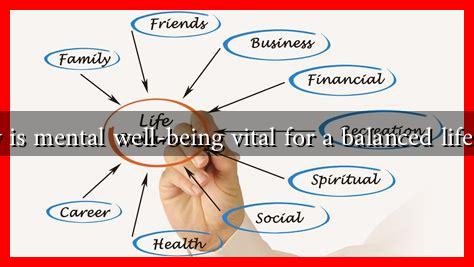-
Table of Contents
Why is Mental Well-Being Vital for a Balanced Lifestyle
In today’s fast-paced world, the importance of mental well-being cannot be overstated. Mental health is not just the absence of mental illness; it encompasses emotional, psychological, and social well-being. It affects how we think, feel, and act, and plays a crucial role in how we handle stress, relate to others, and make choices. This article explores why mental well-being is vital for a balanced lifestyle, supported by research, statistics, and real-life examples.
The Interconnection of Mental and Physical Health
Mental well-being is intricately linked to physical health. Research shows that individuals with good mental health are more likely to engage in healthy behaviors, such as regular exercise, balanced nutrition, and adequate sleep. Conversely, poor mental health can lead to a range of physical health issues, including:
- Cardiovascular diseases
- Obesity
- Diabetes
- Chronic pain
According to the World Health Organization (WHO), depression is a leading cause of disability worldwide, affecting over 264 million people. This statistic highlights the urgent need to prioritize mental well-being as part of a holistic approach to health.
Enhancing Productivity and Performance
Mental well-being significantly impacts productivity and performance in both personal and professional settings. A study conducted by the American Psychological Association found that employees with high levels of mental well-being are:
- More engaged in their work
- Less likely to take sick days
- More creative and innovative
For instance, companies that prioritize mental health initiatives, such as flexible working hours and mental health days, often see a boost in employee morale and productivity. A notable example is the tech giant Google, which offers various mental health resources and programs, resulting in a more engaged workforce.
Building Resilience and Coping Skills
Mental well-being fosters resilience, enabling individuals to cope with life’s challenges more effectively. Resilience is the ability to bounce back from adversity, trauma, or stress. Here are some ways mental well-being contributes to resilience:
- Improved emotional regulation
- Enhanced problem-solving skills
- Stronger social connections
For example, during the COVID-19 pandemic, individuals with strong mental well-being were better equipped to handle the stress and uncertainty. They utilized coping strategies such as mindfulness, social support, and physical activity to maintain their mental health.
The Role of Social Connections
Social connections are a vital component of mental well-being. Positive relationships with family, friends, and colleagues can provide emotional support, reduce feelings of loneliness, and enhance overall happiness. Research indicates that individuals with strong social ties are:
- Less likely to experience depression and anxiety
- More likely to engage in healthy behaviors
- Live longer, healthier lives
For instance, a study published in the journal “PLOS Medicine” found that individuals with strong social relationships had a 50% increased likelihood of survival compared to those with weaker social ties. This underscores the importance of nurturing relationships as part of maintaining mental well-being.
Conclusion: The Path to a Balanced Lifestyle
In conclusion, mental well-being is a cornerstone of a balanced lifestyle. It influences physical health, enhances productivity, builds resilience, and fosters social connections. As we navigate the complexities of modern life, prioritizing mental health is essential for achieving overall well-being. By investing in mental well-being through self-care practices, seeking professional help when needed, and fostering supportive relationships, individuals can lead more fulfilling and balanced lives.
For more information on mental health resources, visit the National Alliance on Mental Illness (NAMI).

